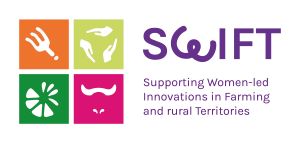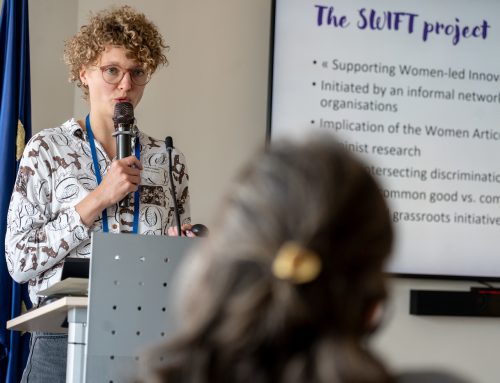By Rita Calvario, Researcher at the Center for Social Studies of the University of Coimbra
On 4 September, during the X International Congress of Agroecology in Viseu (4-6 September), the SWIFT project organised a round table on ‘Women, Migrations and Food Sovereignty: Challenges from Agroecology’.
Chaired by Rita Calvário, from the Centre for Social Studies of the University of Coimbra, the conversation brought together diverse voices such as Rima Rabeya, Bangladeshi and former intercultural mediator and former agricultural sector worker in Odemira, an agricultural export enclave in the south of Portugal; Mery Ann Garling, farmer and social worker from Chile, settled in Euskadi for 17 years and founder of the bicultural project Pewma and member of the peasant union EHNE-Bizkaia; and Conchi Mogo Alonso, activist of the Sindicato Labrego Galego-Comisións Labregas (SLG-CCLL) and member of the Migration and Rural Labour Working Group of the European Coordination Via Campesina since 2021, who shared their stories and struggles in different agricultural and rural contexts.
After introducing the theme of the table, where she highlighted the double/triple discrimination of migrant women in agriculture, both peasant and labourers, due to sexism and patriarchy, racism and xenophobia, and all the bureaucracies and difficulties in having their citizenship rights, Rita pointed out that the agro-industrial model is increasingly based on a precarious and vulnerable, migrant and feminised workforce. From there, SWIFT proposed the theme of the round table, to discuss the invisibilisation and challenges faced by migrant women in the agricultural sector and how agroecology and food sovereignty can be pathways to justice and resistance.
First, the participants introduced themselves. Rima told her story of migration and how it has not been a choice, but she was bound to it in order to live freely her life as a women. In her experience in the agri-food sector she has felt discrimination for being a woman, “black” and migrant, for not speaking Portuguese, and has decided to fight and be active, supporting many migrant women, to fight against gender discriminations they face and for being migrants. Mery Ann told that all migrations are forced displacements, like in Chile due to the agribusiness extractivism and violence. She was a peasant before and she had to be a peasant after migration because she believes food sovereignty is part of changing the world, despite the precariousness of life in the countryside. For her agroecology and living from agriculture is a political commitment, for the defense of land and territory and the right of people to freely circulate. Her farm project is called Pewma, which means “dream” in the Mapuche language. She joined EHNE-Bizkaia to highlight that migrant women are invisibilised, both as migrant and as peasant. For her, no food sovereignty is possible with discrimination against migration in the peasant sector, and without fighting patriarchy and racism. Conchi presented SLG and highlighted the importance of integrating migrant people and women in peasant struggles, because agribusiness is also in minifundia and family farming territories, like in Galicia, and this is a work Via Campesina Europe has been working on since 2012 and they since 2021.
Then, participants talked about the barriers migrant women in agriculture and rural areas face and the importance of creating women’s spaces, promoting intercultural exchanges, and building alliances between a variety of social movements.
Rima described the situation and condition of migrant women working in agriculture in Odemira, most of them from India, Bangladesh and Nepal. Many women migrate for a variety of reasons, including to be independent and escape sexism in their own countries. From countries like India and Bangladesh, there are less women migrating alone because many lack autonomy and are controlled by the family, and inclusively don’t work after marriage, at least with men on their side. This creates specific difficulties from women. A main barrier is language. Women cannot communicate health issues or report situations of sexual abuse or domestic violence. Moreover, they lack information on labour rights and housing is a main problem, with overcrowded homes. She pointed how intermediaries withheld passports for one year to force people to work and the fields lack hygienic conditions and are highly masculine environments, where abuse happens. In addition, wages are low and women find difficult to gain economic independence and they lack a space where they can talk to each other, share their experiences, their problems, and find solutions together.
Mery comes from a territory where people are in the land, not on the land, stressing the importance of ancestors and their agroecological knowledge, and fighting against all the attacks against indigenous people who are being expelled and imprisoned, like the Mapuche people. People “migrate with their own roots” and that is why one must consider the cultural diversity of migrant women and engage in knowledge exchanges between all who live in territories. She lead a study of migrant women in agriculture in EHNE-Bizkaia from this perspetive, identifying 20 women who are involved in food supply projects in the countryside. Migrant women face many barriers because they are racialised women, from all sides. This counts in claiming territories as spaces where people live and work, not just flags. As peasants and as migrants, they face many barriers with the institutions. They are not financed by European funds, because they are peasant, and peasant women, and because they are migrants. Also, peasant women face invisibility in a highly masculine «agro» space, they have triple work – as mothers, care work, and in the field, all of this increases in being a migrant peasant women. But women do not believe in victimisation, they raise from the their own strength and struggle for change.
Conchi talked about the «agro» world in Galicia, where until recently there were no large agribusiness companies. For many years, the smallholding structure was blamed for the lack of agriculture development. But this study shows, among many others, small farms are the ones who take care of the territories and feed the populations. Neoliberalism is to blame for the fact that small agriculture is no longer strong. For this reason, SLG supports many small productions, and up to 2021 it had not worked with migrant collectives and campaigned against agribusiness large companies. In 2021, they started noticing that a red fruit company from Huelva, which is also in Odemira, and in Marrocos and Kenya, controlling all the supply chain of red fruits, is renting land in Galicia, more and more, already 86 hectares, in an unpopulated territory with abundance of water. All of this meant land grabbing, working people living badly locally, especially of migrant women working on these farms, and environmental problems. Since then, they have become active in Via Campesina Europe Group of Rural Workers and Migrants. She highlighted the importance of raising consciousness among people and building alliances, between peasant organisations, agroecological and food sovereignty movements, migrant collectives, and with feminist groups, ecological groups, workers organisations, and the health sector. Peasant organisations must be aware that many of the people who migrate and work in agribusiness are peasants who have been expelled from their territories: “we need to work together.”
At the end, after opening the debate, the speakers stressed the diversity of migrant women experiences and profiles and made some conclusion remarks. Rima told that in Odemira, women often do not migrate alone, as some women have little autonomy and many suffer from sexist violence, thus having to break many barriers. These barriers add to the problems they face related to labour overexploitation, job insecurity, racism, and many more in their lives in agriculture and rural villages. For her, talking of capitalism, agribusiness, and so on is a too big world. Her concern is for women’s safety from violence, sexism, labour abuse, lack of women’s participation, etc., and there is the need to raise awareness about women’s rights because “the world is impossible without women.”
Conchi stressed that in Huelva, and other parts of Spain, companies do ‘contracts of origin’ for 6 months, hiring mothers so that they do the work and go back, whereas Mery highlighted the many undocumented migrant women from Latin America that work precariously and cannot denounce abuses, and that the majority of these women leave their territories because the agri-food industry has driven people out of their territories due to territorial extractivism.
Conchi and Mery also talked about how the CAP favours large instead of small farms, does not supports generational turnover neither agroecology. Conchi emphasized, about the social conditionality that mandates labour rights on farms, to be applied in 2024, that nothing has been done so far. Also, the lack of support to generational turnover is a problem and “we risk a lack of healthy and agroecological products in any time soon”. Mery mentioned that it is difficult to convince young people to come to the countryside, as returns are low. Only by ideological awareness and a change of life, because it’s not attractive in this current capitalist model. She concluded by saying that the alliance of a anti-patriarchal and anti-racist model and the migrant women can bring a lot of knowledge and from there we can reinvent ourselves.




